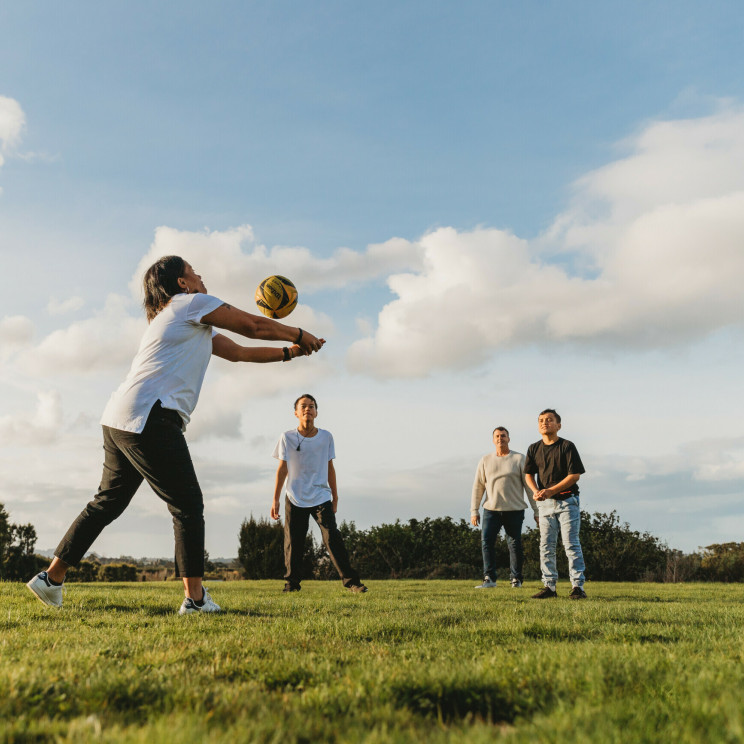Read about living well with lung cancer, including finding body positivity, making lifestyle changes and accessing support in your community.
Download the whole lung cancer booklet
Our new booklet 'Understanding lung cancer' is available now.
Download Section Seven of our lung cancer booklet: Living well with lung cancer
- Because lung cancer is strongly linked to smoking, many people with lung cancer, whether they have smoked or not, experience negative attitudes from others and sometimes themselves.
- It may be helpful know that:
- as many as 15 percent of people with lung cancer have never smoked
- other factors may cause lung cancer, including air pollution, asbestos and second-hand smoke
- smoking was a normal part of life in New Zealand for many years
- smoking is one of the most difficult addictions to give up.
- Finding ways to focus positively on your body – such as eating well, starting a new exercise programme, and making positive lifestyle changes – can help you live well with lung cancer.
- A counsellor can help you to talk about your feelings around the impact a cancer diagnosis can have.
- Hospitals throughout New Zealand have trained health workers available to support your spiritual, cultural and advocacy needs.
- Talk to your whānau doctor, or your local Cancer Society, about the support services available for you and your family.
- Nā te mea he kaha te hāngai o te matepukupuku ki te kai paipa, he nui ngā tāngata whai matepukupuku pūkahukahu e rongo ana i ngā waiaro korehanga mai ētahi atu, mehemea i kai paipa, i kore rānei i kai paipa.
- Tērā pea he pai te mōhio ki ēnei:
- Tae noa ki te 15 ōrau ngā tāngata whai matepukupuku pūkahukahu kīhai rawa i kai paipa
- Ara ētahi atu take tērā pea puta ai te matepukupuku pūkahukahu, tae noa ki parahanga hau, te papa kiripaka me te kai paipa whai pānga tuarua
- Ko te kai paipa tētahi o ngā waranga tino uaua rawa ki te whakamutu.
- Mā te rapu huarahi ki te arotahi pai ki tō tinana- pērā ki te kai pai, te tīmata i tētahi hōtaka korikori hou, me te mahi i ētahi panoni toiora pai- tērā ka āwhina i a koe ki te noho ora me te matepukupuku pūkahukahu.
- Ka āhei tētahi kaitautāwhi ki te āwhina i a koe ki te kōrero mō ōu kāre ā-roto mō te papātanga o tētahi whakatau mate matepukupuku.
- Ka whai ngā hōhipera huri noa i Aotearoa, i ngā kaimahi hauora kua whakangungutia ki te tautoko i ōu hiahia wairua, hiahia ahurea, hiahia whaitaua hoki.
- Kōrero ki tō tākuta whānau, ki tō Kahui Matepukupuku i tō rohe mō ngā ratonga tautoko e wātea ana ki a koe me tō whānau.

Negative attitudes to lung cancer
Because lung cancer is strongly linked to smoking, many people with lung cancer, whether they have smoked or not, experience negative attitudes from others and sometimes themselves.
It may be helpful know that:
- as many as 15 percent of people with lung cancer have never smoked
- other factors may cause lung cancer, including air pollution, asbestos and second-hand smoke
- smoking was a normal part of life in New Zealand for many years
- smoking is one of the most difficult addictions to give up.
Finding support
For some people, meeting others in a similar situation can help decrease feelings of anxiety, isolation or fear.
Support groups offer you the opportunity to share your experiences and learn different ways of dealing with problems.
Counselling
A counsellor can help you to talk about your feelings around the impact a cancer diagnosis can have, and help you work on healthy coping strategies.
You can phone the Cancer Information Helpline (0800 CANCER 226 237) for information about support services in your area.
Body image, keeping active and eating well
Finding ways to focus positively on your body can help you live well with lung cancer.
This includes factors such as eating well, starting a new exercise programme like yoga, and making positive lifestyle changes.
Cultural and spiritual support
Hospitals throughout Aotearoa New Zealand have trained health workers available to support your spiritual, cultural and advocacy needs.
They may include Māori and Pacific health workers who will work with you and your whānau. Hospital chaplains and community-based health workers are also available.
How families/whānau can help
As a friend or whānau member of someone diagnosed with lung cancer, you are also learning to cope with your own feelings and emotions.
You may want to help but may not know what to do. The Cancer Society offers a range of resources to support you.
We also have an online tool – Support Crew – to help you coordinate offers of help such as meals, childcare, cleaning. You can also use it as a secure online channel to send updates to whānau members and friends. This is free to use.
Questions you may wish to ask
When you hear you have lung cancer, you and your whānau may have many questions.
We have compiled a list of questions you may want to ask to help you make the most of your time with your doctor.
Let your doctor know if there are things you would prefer not to be told.
Find out more about questions you may wish to ask
Download the 'Questions you may wish to ask' booklet
Download the 'Questions you may wish to ask' information sheet
